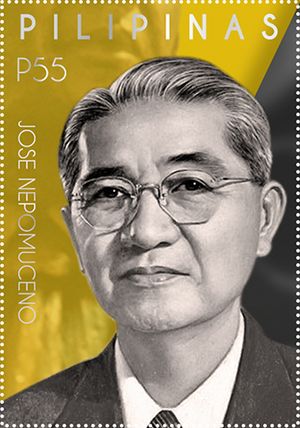José Nepomuceno facts for kids
Quick facts for kids
José Nepomuceno
|
|
|---|---|

Nepomuceno on a 2019 stamp of the Philippines
|
|
| Born | May 15, 1893 |
| Died | December 1, 1959 (aged 66) Tuguegarao, Cagayan, Philippines
|
| Occupation | Editor, Photographer, Filmmaker |
| Spouse(s) | Isabel Acuno |
| Children | 8 |
José Zialcita Nepomuceno (born May 15, 1893 – died December 1, 1959) was a very important person in the history of movies in the Philippines. He is often called the "founder of Philippine movies" because he was one of the first people to direct and produce films in the country. He even had his own company called Jose Nepomuceno Productions.
The Start of Philippine Movies
José Nepomuceno made the very first Filipino silent film called Dalagang Bukid ("Country Maiden") in 1919. This movie was a big deal because it showed that Filipinos could make their own films. A famous actress named Atang de la Rama, who later became a National Artist of the Philippines, starred in it.
In 1920, he directed another film called Un Capullo Marchito ("A Wilted Rosebud"). This movie helped make Luisa Acuña a popular leading lady in Filipino silent films. Nepomuceno's work helped start the film industry in the Philippines. He showed that local stories and actors could be successful on the big screen.
Films Directed by Nepomuceno
José Nepomuceno directed many films during his career. Here are some of his notable works:
- Dalagang Bukid ("Country Maiden") (1919)
- La Venganza de Don Silvestre (1920)
- Un Capullo Marchito (1920)
- Ang Tatlong Hambog ("The Three Humbugs") (1926)
- Ang Manananggal (1927)
- Hot Kisses (1927)
- The Filipino Woman (1927)
- Ang Lumang Simbahan ("The Old Church") (1928)
- The Pearl of the Markets (1929)
- Sa Landas ng Pag-ibig ("The Path of Love") (1929)
- Child Out of Wedlock (1930)
- Noli Me Tángere (1930)
- The Young Nun (1931)
- The Secret Pagan God (1931)
- Moro Pirates (1931)
- At Heaven's Gate (1932)
- Stray Flowers (1932)
- Punyal na Guinto ("Golden Dagger") (1933)
Films Produced by Nepomuceno
Besides directing, José Nepomuceno also produced films. This means he helped fund and organize the making of the movies.
- Ang Tatlong Hambog ("The Three Humbugs") (1926)
- La mujer Filipina (1927)
 | Chris Smalls |
 | Fred Hampton |
 | Ralph Abernathy |

